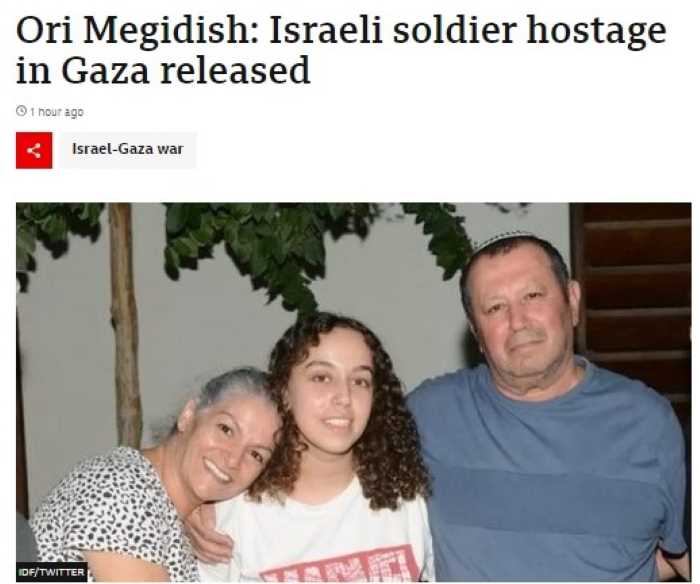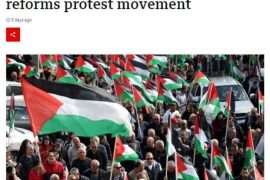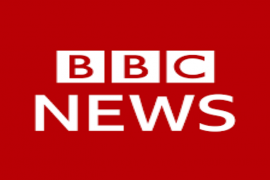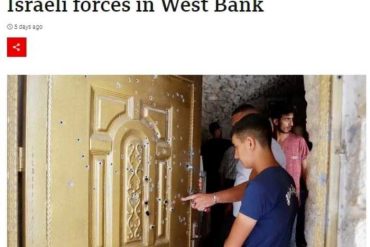When it’s boiled down, journalism is all about language. A journalist’s choice of words clearly influences the framing of a story and the messaging taken away by audiences as a result. Headlines are of course particularly sensitive territory; poor language choices can attribute – or deny – responsibility or credit for actions that are the basis of a story and, as we know, a great many people never read past the headlines.
When the BBC’s CEO of news and current affairs Deborah Turness tried to do damage control last week following extensive public criticism of BBC coverage of the current war between Israel and the terrorist organisation Hamas, one of the topics she raised was “our use of language”.
“Our use of language is also a hotly-debated topic, and one which is of great importance to our audiences. The BBC uses the word ‘terrorist’ with attribution. When we mention Hamas, we make it clear, where possible, that they are a proscribed terrorist organisation by the UK government and others. We are also using the phrases ‘terror attack’ and ‘act of terror’ with attribution.
As has been reported, we have moved away from using the word ‘militant’ as a default description of Hamas or Hezbollah fighters. But we don’t ban words, and there may be times now or in the future when it’s appropriate to use the term.
We also need to think carefully about how we talk about civilian deaths, and how the language we use may, unintentionally, give the impression we view some deaths as more important than others or treat people on either side differently. A tweet which said people ‘died’ in Gaza and ‘were killed’ in Israel has been widely used as an example of this. It’s important that we all think carefully about the language we use to avoid creating a false impression.”
Of course, the BBC’s inconsistent use of the term terrorist is far from the sole issue for debate. For example, since October 9th its coverage of the current conflict has been presented under the tag “Israel-Gaza war”, despite the fact that Israel is not at war with “Gaza” but with internationally proscribed terrorist organisations which operate out of the Gaza Strip. A tag phrased “Israel-Hamas war” would obviously have been more accurate and informative.
Another example came to light on the evening of October 30th when the BBC News website published an uncredited report headlined “Ori Megidish: Israeli soldier hostage in Gaza released”.
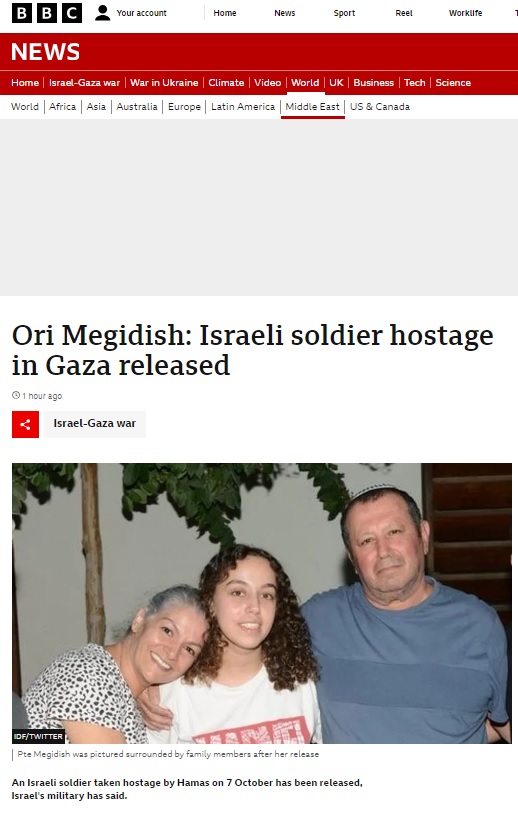
The original version of that report – which remained online for some three hours – read as follows: [emphasis added]
“An Israeli soldier taken hostage by Hamas on 7 October has been released, Israel’s military has said.
Pte Ori Megidish was released during ground operations in Gaza on Sunday night and was reunited with her family, the Israel Defence Forces (IDF) said.
They added that she had undergone medical checks and was “doing well”, but gave no details of her release.
She is the fifth hostage to be released and the first soldier. At least 230 people are still being held.”
That last sentence is particularly confusing given that – as the BBC well knows – four female hostages were previously released by their Hamas captors on October 20th and on October 23rd.
Private Ori Megdish was however not ‘released’ by Hamas as the BBC’s phrasing implies. As reported by the Times of Israel and others, she was rescued by IDF forces.
“Security forces announced Monday evening that a soldier abducted by Hamas earlier this month had been rescued from the Gaza Strip in an overnight operation, the first captive taken in the terror group’s shock assault on October 7 to be freed by Israeli troops.
In a joint statement, the Israel Defense Forces and the Shin Bet security agency said Pvt. Ori Megidish was in good condition and had reunited with her family.
The IDF said she was rescued during a ground operation overnight, without giving further details.”
Perhaps due to the ensuing criticism on social media, the BBC amended its headline and report some three hours after the initial publication. The headline now states “Ori Megidish: Israeli soldier hostage in Gaza rescued” and the first three paragraphs now read: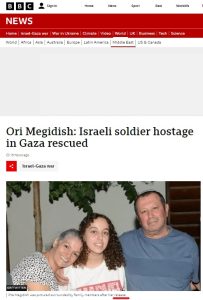
“An Israeli soldier taken hostage by Hamas on 7 October has been rescued, Israel’s military has said.
Pte Ori Megidish was freed during ground operations in Gaza on Sunday night and was reunited with her family, the Israel Defence Forces (IDF) said.
They added that she had undergone medical checks and was “doing well”, but gave no details of her release.”
However, the sentence following that has not been amended and still makes no distinction between the four female hostages released by Hamas and the soldier rescued by Israeli forces:
“She is the fifth hostage to be released and the first soldier.”
Five days after Deborah Turness publicly stated that “It’s important that we all think carefully about the language we use to avoid creating a false impression”, the BBC’s inappropriate language choices continued to confuse and mislead audiences.

